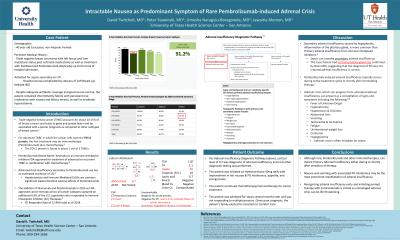Sunday Poster Session
Category: Functional Bowel Disease
P0650 - Intractable Nausea as Predominant Symptom of Rare Pembrolizumab-Induced Adrenal Crisis
Sunday, October 27, 2024
3:30 PM - 7:00 PM ET
Location: Exhibit Hall E

Has Audio

David K. Twitchell, MD
University of Texas Health Science Center
San Antonio, TX
Presenting Author(s)
David K.. Twitchell, MD1, Peter Stawinski, MD1, Umesha Naragalu, MD2, Jawairia Memon, MD1
1University of Texas Health Science Center, San Antonio, TX; 2University of Texas Health San Antonio, San Antonio, TX
Introduction: Triple-negative breast cancer (TNBC) has a poorer prognosis compared to other breast cancer subtypes due to its propensity toward rapid growth and metastasis. Although TNBC treatment options are limited, Pembrolizumab combined with chemotherapy is the first-line therapy for metastatic, unresectable cases of TNBC. Among its adverse effects, Pembrolizumab rarely causes adrenal insufficiency which can progress to adrenal crisis if untreated.
Case Description/Methods: A 40-year-old Caucasian Female had a history of Stage IV Triple Negative Breast Cancer (TNBC) with Bony and Liver Metastasis. She was status post left breast total mastectomy and 4 months of treatment with Paclitaxel and Pembrolizumab, complicated by tumor recurrence. She presented to our hospital with presumed sepsis secondary to a suspected breast abscess without bacteremia, severe hyponatremia, and PO intolerance with intractable nausea and vomiting over the past week. Despite aggressive antibiotic therapy, the patient remained intermittently febrile and PO intolerant refractory to multiple anti-emetic agent failures throughout her prolonged hospital course. The Gastroenterology team was consulted on Day 17 of hospital admission to assist in managing PO intolerance. Of note, the patient had never previously experienced PO intolerance while on this chemotherapy/immunotherapy regimen. Morning serum cortisol was 0.7 mcg/dL, strongly suggesting adrenal insufficiency. The patient was started on Hydrocortisone 50 mg daily and quickly had abatement of her PO intolerance and fevers with improvements in her appetite and energy. She was transitioned to an alternative cancer treatment regimen and continued long-term corticosteroid therapy. She had several subsequent hospital admissions for sepsis bacteremia which eventually resulted in a severe metabolic acidosis requiring intubation due to compensatory respiratory fatigue. Given her grim prognosis, her family chose to transition her to Comfort Care and she passed shortly after.
Discussion: Pembrolizumab is approved for the treatment of many cancers, including TNBC, and has demonstrated increased survival rates when co-administered with chemotherapy as compared to chemotherapy alone. The syndrome of fever, hyponatremia, fatigue, unintentional weight loss, and PO intolerance should provoke testing for adrenal insufficiency, particularly in patients with risk factors such as long-term steroid use or who have received immunotherapy. Adrenal crisis is often mistaken for sepsis.
Disclosures:
David K.. Twitchell, MD1, Peter Stawinski, MD1, Umesha Naragalu, MD2, Jawairia Memon, MD1. P0650 - Intractable Nausea as Predominant Symptom of Rare Pembrolizumab-Induced Adrenal Crisis, ACG 2024 Annual Scientific Meeting Abstracts. Philadelphia, PA: American College of Gastroenterology.
1University of Texas Health Science Center, San Antonio, TX; 2University of Texas Health San Antonio, San Antonio, TX
Introduction: Triple-negative breast cancer (TNBC) has a poorer prognosis compared to other breast cancer subtypes due to its propensity toward rapid growth and metastasis. Although TNBC treatment options are limited, Pembrolizumab combined with chemotherapy is the first-line therapy for metastatic, unresectable cases of TNBC. Among its adverse effects, Pembrolizumab rarely causes adrenal insufficiency which can progress to adrenal crisis if untreated.
Case Description/Methods: A 40-year-old Caucasian Female had a history of Stage IV Triple Negative Breast Cancer (TNBC) with Bony and Liver Metastasis. She was status post left breast total mastectomy and 4 months of treatment with Paclitaxel and Pembrolizumab, complicated by tumor recurrence. She presented to our hospital with presumed sepsis secondary to a suspected breast abscess without bacteremia, severe hyponatremia, and PO intolerance with intractable nausea and vomiting over the past week. Despite aggressive antibiotic therapy, the patient remained intermittently febrile and PO intolerant refractory to multiple anti-emetic agent failures throughout her prolonged hospital course. The Gastroenterology team was consulted on Day 17 of hospital admission to assist in managing PO intolerance. Of note, the patient had never previously experienced PO intolerance while on this chemotherapy/immunotherapy regimen. Morning serum cortisol was 0.7 mcg/dL, strongly suggesting adrenal insufficiency. The patient was started on Hydrocortisone 50 mg daily and quickly had abatement of her PO intolerance and fevers with improvements in her appetite and energy. She was transitioned to an alternative cancer treatment regimen and continued long-term corticosteroid therapy. She had several subsequent hospital admissions for sepsis bacteremia which eventually resulted in a severe metabolic acidosis requiring intubation due to compensatory respiratory fatigue. Given her grim prognosis, her family chose to transition her to Comfort Care and she passed shortly after.
Discussion: Pembrolizumab is approved for the treatment of many cancers, including TNBC, and has demonstrated increased survival rates when co-administered with chemotherapy as compared to chemotherapy alone. The syndrome of fever, hyponatremia, fatigue, unintentional weight loss, and PO intolerance should provoke testing for adrenal insufficiency, particularly in patients with risk factors such as long-term steroid use or who have received immunotherapy. Adrenal crisis is often mistaken for sepsis.
Disclosures:
David Twitchell indicated no relevant financial relationships.
Peter Stawinski indicated no relevant financial relationships.
Umesha Naragalu indicated no relevant financial relationships.
Jawairia Memon indicated no relevant financial relationships.
David K.. Twitchell, MD1, Peter Stawinski, MD1, Umesha Naragalu, MD2, Jawairia Memon, MD1. P0650 - Intractable Nausea as Predominant Symptom of Rare Pembrolizumab-Induced Adrenal Crisis, ACG 2024 Annual Scientific Meeting Abstracts. Philadelphia, PA: American College of Gastroenterology.
